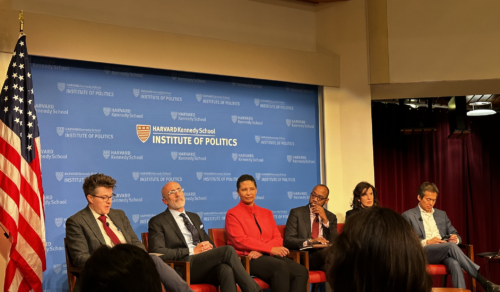As Harvard grapples with the fallout from responses to the Oct. 7th attacks against Israel, the campus has become a microcosm of global discord. The recent months have been tumultuous, marked by Claudine Gay’s resignation as University President, the controversial exposure of pro-Palestinian students’ personal details, and relentless advocacy from both pro-Israeli and pro-Palestinian factions. Amidst this maelstrom of dissent, Harvard’s prestigious position in the national and international spotlight magnifies every nuance of the debate. This backdrop made the John F. Kennedy Jr. Forum’s discussion at the Harvard Kennedy School’s Institute of Politics on dissent and democracy an especially fitting way to kick off its Spring 2024 programming.
Harvard’s landscape is a battleground of opinions, underscored by a unique blend of academic fervor and political activism. Yet, amidst this division, a consensus emerges: there is an urgent need to elevate the quality of discourse on campus. Balancing the sanctity of free speech with the principles of effective academic inquiry becomes a challenge too essential to ignore.
The Forum’s discussion, on January 25th, featured six intellectual heavy-weights from the Kennedy School’s faculty. They shared findings from their research and personal experiences on the importance of fostering productive disagreement in democracies generally, and Harvard specifically. However, the Forum notably fell short of offering convincing solutions to these challenging issues. Instead, the speakers mostly provided guidance on how individuals might engage in more constructive one-on-one dialogues, highlighting the personal responsibility in fostering better communication.
Professor Cornell Brooks, who formerly served as president of the NAACP and is an ordained minister, focused his remarks on the three pillars he abides by when engaging in difficult conversations. First, especially when trauma is involved, genuine dialogue demands mutual respect and good faith. To establish this trust, one must focus on the feelings involved, especially grief and/or trauma, before discussing public policy. His second pillar clarified, though, that experiencing traumatic effects of bad policy must not be considered a prerequisite for talking about the policy—personal experience does not provide a right to silence others.
“If you’ve been stopped, as I have, 25 to 30 times by the police without getting a ticket for the crime of driving while Black, walking while Black, maybe I have an epistemological advantage—maybe—in terms of understanding policing at a certain level,” Brooks said. “But I don’t have an epistemological monopoly.”
Third, Brooks argued against engaging in performative speech. He suggested instead to trust one’s power of persuasion—to enter hard conversations with the purpose of making an impact on the other person and to engage for long enough to achieve one.
While beneficial for personal engagement on contentious issues, student perspectives indicate that meaningful change requires substantial institutional action in addition to individual action. At Harvard, where isolation from opposing viewpoints is challenging, one-on-one dialogues across differing perspectives happen but are insufficient to significantly improve campus discourse.
Violet Barron ’26, a Social Studies concentrator in Adams House, is a member of Jews for Palestine—an anti-Zionist group on campus formed in the aftermath of the October 7th attacks—and is currently facing disciplinary action before the Ad Board for having occupied University Hall with eight other students in November. One of her close friends is pro-Israel, and the conflict invariably arises in conversation. While she thinks this helps her protect against falling into an echo chamber, she wishes there were also opportunities for more structured dialogue.
“I know there’s no organizational level dialogue between students with very different views, which just has to be a bad thing,” she said. “Everyone, including myself, has their qualms with Harvard, but I think it could be, perhaps, the most nonpartisan way to get such a space off the ground.”
Alex Bernat ’25, a Computer Science and Mechanical Engineering concentrator in Lowell House, agrees with Barron on the need for and use of dialogue, though he holds very different views on the Israel-Palestinian conflict. He has been involved in efforts on campus to draw attention to the plight of the hostages still being held by Hamas, the group that has controlled the Gaza Strip since 2006 and which organized the October 7th attacks.
“I consider myself a free speech absolutist, but do worry about time, place, and manner,” he said. Some pro-Palestinian protests have disrupted classes, which he condemned as a threat to academic inquiry. He hopes that the administration does more to facilitate productive dialogue on campus, perhaps by hosting public conversations between faculty members with strongly pro-Israel views and those with strongly pro-Palestine views.
Despite widespread dissatisfaction with the performance of the Harvard community during the tumultuous last few months, doing better is no simple task. “There is a real hunger for being able to marry protection of free expression and mutual respect,” University Professor Danielle Allen said at the Forum. “It’s a ‘how’ question, not a ‘whether’ question.”
Jude Herwitz ’25 (jherwitz@college.harvard.edu) is faster than 99% of players on Sudoko.com, at medium difficulty.

